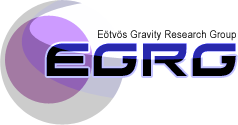
 |
|
|
I N T R O D U C T I O N
EGRG conducts a vigorous research program aiming to study gravitational waves of cosmic origin and to contribute to the development of advanced interferometric gravitational-wave detectors.
Gravitational wave radiation carries information from the highly curved regions of the universe, that are otherwise not accessible with traditional electromagnetic observations. The regular detection of gravitational waves would be a tremendous achievement (i) for general relativity, allowing a unique opportunity to test the local spacetime around black holes, (ii) for cosmology, testing the luminosity distance-redshift relationship, (iii) for the large-scale structure, constraining the hierarchical structure formation scenarios, and (iv) for astrophysics, offering a precise direct measurement of the Eddington ratio, BH accretion physics, and will observationally constrain the abundance and composition of dense populations of compact objects in galactic nuclei and globular clusters.
EGRG is formed by researchers at a major Hungarian university (Loránd Eötvös University, Budapest). Visiting international scientists and undergraduates also take a significant part in the group's professional work. Our group is committed to the highest quality education, and we believe that hands on laboratory experience for students is of utmost importance.
Our solid expertise ranges from theory, through data analysis to hardware. We also carry out a major work in scientific outreach, giving both academic and public talks in the field of gravitational-wave physics. EGRG has the significant expertise to carry out mission critical projects to fruition and to also help raise the future generations of gravitational-wave scientists.
|
| (c) Eötvös Gravity Research Group 2007 |